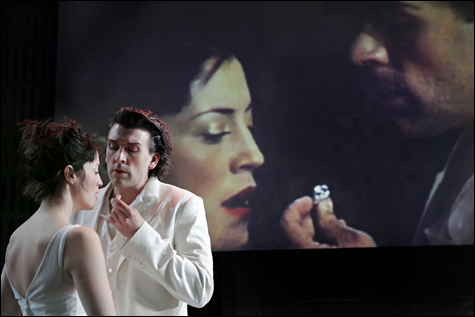
|
Tracy Chapman sang about revolution that “sounds like a whisper,” but at the American Repertory Theatre, for the next month or so, the French Revolution will be broadcast loud and clear. The Minneapolis-based Théâtre de la Jeune Lune is teaming up with the Cambridge troupe to present two original musical productions: Don Juan Giovanni and Figaro. The former squeezes Molière’s Don Juan with Mozart’s Don Giovanni into a contemporary road trip; the latter is adapted from La mère coupable, the final play of French playwright Beaumarchais’s Figaro trilogy, with additions from Mozart’s Le nozze di Figaro.
“It is an interesting dialogue between the two pieces,” says co-conceiver and director Dominique Serrand of Don Juan Giovanni and Figaro. “Also between a company of actors to see how people can change roles and to see the versatility of performers, which is always very interesting.” Jeune Lune’s Serrand, whose previous productions at ART include The Miser, Amerika, and Carmen, will also act in the two works, playing Don Juan in Giovanni and Figaro’s Mr. Almaviva. In fact, all 10 cast members (none of them ART regulars) will perform in both plays.
“The Molière Don Juan is looked at as the grand seducer, which I think is wrong,” Serrand says of the one work in the two pairings that seriously predates the French Revolution, the 1665 Don Juan. “In Molière's mind, it was much more: his Don Juan was a troublemaker, the one who upsets the system by using seduction. This is a tool for Molière, and it allows him to create this character who is morally wrong, so Molière is free to question the [whole] system.” For Serrand, the seduction aspects are secondary to Molière’s “focus on disturbing the order of things, which makes it a pre-Revolutionary piece.”
Serrand notes that there has been a cultural shift in American audiences since Jeune Lune debuted Don Juan Giovanni in 1994. (Figaro had its premiere in 2003.) “Things we could get away with 12 years ago people are [now] shocked by. There’s a response to morality that is different. People have gotten very conservative. Now it seems like it’s a little bit edgy for some people and difficult to swallow.”
Jeune Lune’s productions have also been acclaimed for their inventive, Jacques Lecoq–inspired theatricality. Both Don Juan Giovanni and Figaro boast theater, opera, multimedia — and a functional vehicle. “It's a little bit like Thelma & Louise,” says Serrand, “with a car on stage that moves and two stories side by side.”